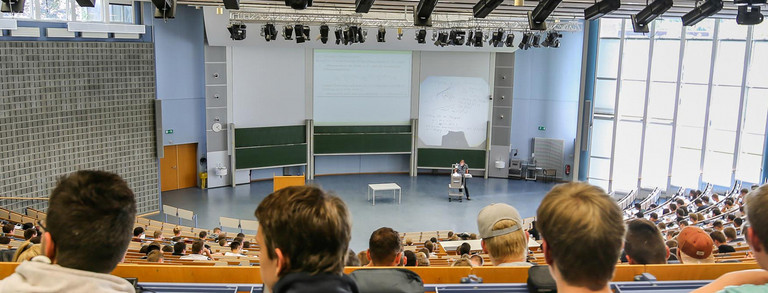Master (1 subject)
The International Master of Advanced Methods in Particle Physics (IMAPP) is a joint program of the University of Bologna (Italy), the University of Clermont Auvergne (France) and the TU Dortmund University (Germany), supported by internationally renowned partner institutions. The program focuses on experimental and theoretical particle physics.
to the degree program Advanced Methods in Particle Physics (Master of Science (M.Sc.))
Today, new knowledge in science, economics, management, and technology is created almost exclusively from large quantities of complex data. The ability to process such data competently and good academic training in this area are in demand in the job market. The proper handling of patient or customer data, share prices and returns, and weather or climate information is well paid and increasingly in demand.
to the degree program Data Science (Master of Science (M.Sc.))
The Master’s program in Chemistry enables students to expand their knowledge and practical skills with regard to the current state of research in order to work independently, e.g. in the field of research, development, production or analytics. As the courses are mainly held in English, the students learn to master the English technical terms confidently and to apply them in an international environment in their professional life.
The Master’s degree program in Business Administration and Economics offers the possibility of specialization in a particular professional field. It can be connected seamlessly to the Bachelor’s degree program, but can also be taken up after a period of practical work experience and appeals to all those who value a practice-oriented, interdisciplinary and internationally oriented education with numerous options.
to the degree program Business Administration and Economics (Master of Science (M.Sc.))
The education in the English-language specialization Process Systems Engineering enables students to design and operate complex chemical and biochemical production systems with the help of mathematical models and modern computer tools for simulation and optimization. Graduates also master methods of control and production planning as well as the analysis and description of experimental data. Process engineers are in great demand on the market, as it gives the chemical engineer the opportunity to acquire all the knowledge necessary not only for the planning of a chemical plant, but also for its simulation and optimization.
to the degree program Process Systems Engineering (Master of Science (M.Sc.))
The Master’s degree program qualifies students for the increasing demand in professional practice for planning know-how with a sound scientific foundation. It teaches them the ability to organize and manage planning projects at all planning and decision-making levels as well as to lead interdisciplinary working groups. Together with a Bachelor’s degree in a relevant subject, the Master’s degree additionally permits graduates to commence a traineeship in urban development within the civil service.
to the degree program Spatial Planning (Master of Science (M.Sc.))
The degree program is an English-language Master of Science program with a focus on data analysis in scientific disciplines of sports science.
to the degree program Data Science in Sports and Health (Master of Science (M.Sc.))
Important facts about Master's programs (1-subject)
- The master's degree is the second qualifying university degree. As a rule, a bachelor's degree has already been successfully completed in advance.
- The standard period of study in the Master's program is at least one and at most two years.
- Depending on the course of study, TU Dortmund University awards the degrees Master of Science (M.Sc.) and Master of Arts (M.A.).
- Within the scope of the 1-subject Master's degree, you will study one course of study.
- The Master's degree enables you to pursue a doctorate.





![[Translate to English:] Partner Four hands are holding the green logo of TU Dortmund University](/storages/tu_website/_processed_/1/d/csm_Partner_Nicole_Rechmann_KW_670eba0154.jpg)




![[Translate to English:] Forschung An apparatus with tubes in a laboratory](/storages/tu_website/_processed_/0/c/csm_Forschung_Juergen_Huhn_4fa3153b51.jpg)
![[Translate to English:] Studium Five students are sitting in a lecture hall. They are talking to each other.](/storages/tu_website/_processed_/c/9/csm_Studium_FelixSchmale_dbdbfb0dd7.jpg)





